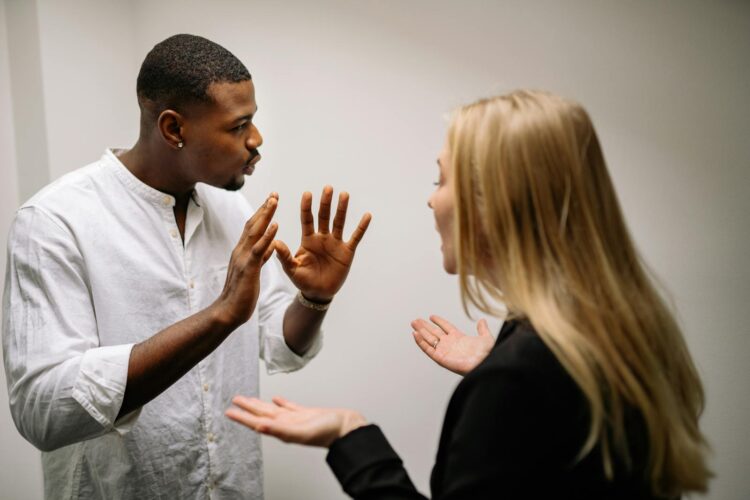
The way people speak to each other shapes the health of a relationship. Words can comfort, inspire, and bring you closer, but they can also damage trust and connection when used carelessly or with hidden motives. These phrases should never be taken lightly, and if they become common, it may be time to reconsider the relationship.
“You’re overreacting.”

This phrase instantly shuts down emotional expression. It tells the other person their feelings are exaggerated, irrational, or unworthy of attention. Instead of listening and trying to understand the cause of the reaction, it labels them as unreasonable. Eventually, this can make a partner feel silenced and invalidated, leading them to withdraw from sharing their feelings altogether.
“If you really loved me, you would…”

This is a manipulative tactic that uses love as a bargaining chip. It pressures the other person into doing something they may be uncomfortable with by questioning the depth of their feelings. Real love is not a test or a tool for coercion. It allows freedom of choice and respects boundaries. Using this phrase erodes trust because it replaces mutual respect with guilt-driven compliance, leaving the relationship feeling transactional rather than genuine.
“You’re too sensitive.”

Telling someone they are too sensitive dismisses their emotional reality and makes them feel flawed for having certain feelings. It shifts the focus away from what caused the hurt and places blame on their reaction instead. This behaviour can be very damaging over time, making them doubt whether their emotions are valid or worth expressing.
“I guess you’re perfect, then.”

This sarcastic statement is often used to deflect accountability when a partner points out a problem. Rather than addressing the issue, it turns the conversation into a personal attack, implying that the other person is being self-righteous or unrealistic. Sarcasm in these moments rarely resolves anything and often makes conflicts more tense.
“You always…” or “You never…”

These absolute statements are unfair because they exaggerate behavior and ignore exceptions. They make the other person feel like their positive actions have been erased from memory. Even if there is truth to the complaint, framing it in extremes invites defensiveness rather than understanding. Over time, using this kind of language can make conflicts harder to resolve because it replaces constructive criticism with accusations that feel personal and permanent.
“I don’t care.”

When a partner uses this phrase during important conversations, it communicates indifference toward the topic and, by extension, toward the other person’s feelings. Even if it is meant as a way to avoid conflict, it sends a message that their concerns are irrelevant. Hearing “I don’t care” repeatedly can create emotional distance and make the relationship feel one-sided.
“That’s just how I am.”

This phrase is often used to shut down feedback or avoid making changes. While personality traits are real, relationships require compromise and growth. Saying “That’s just how I am” dismisses the other person’s needs and refuses the possibility of self-improvement. Eventually, it can make a partner feel like their concerns will never be addressed.
“You’re lucky I put up with you.”

This is a deeply hurtful phrase that belittles the other person and makes them feel like a burden. It shifts the power dynamic in the relationship by implying that one person is doing the other a favor simply by staying. This can lead to feelings of low self-worth and dependency. Healthy relationships are based on mutual appreciation, not on one partner feeling superior or doing the other a reluctant kindness.
“Whatever.”

Although short, “whatever” can carry a heavy weight of dismissiveness. It often signals that the speaker has stopped caring about the discussion and is unwilling to work toward resolution. It can also be used to shut down the other person’s point without addressing it. When used regularly, it undermines meaningful communication and leaves the other person feeling unheard and dismissed, which eventually chips away at emotional intimacy.
“You made me do this.”

This phrase removes personal responsibility and places blame on the other person for the speaker’s actions. It is manipulative because it suggests that their behavior is a direct cause of the harm, which can create guilt and confusion. This type of blame-shifting is common in toxic relationships and can lead to a loss of confidence and autonomy. In reality, everyone is responsible for their own choices and actions.
“I was just joking.”

When someone uses this after making a hurtful comment, it serves to invalidate the other person’s feelings. It hides criticism or cruelty under the guise of humor, making it harder to address directly. This behavior destroys trust because it creates uncertainty about whether comments are sincere or meant to wound.
“You’re imagining things.”

This is a classic example of gaslighting. It makes the other person question their own memory, perception, or judgment. In the long run, hearing this phrase can lead to self-doubt and dependence on the other person for a sense of reality. It is a manipulative tactic designed to avoid responsibility and can be highly damaging to emotional and mental well-being in a relationship.
“It’s not a big deal.”

While something may not seem important to one partner, it can still hold meaning for the other. Saying “It’s not a big deal” dismisses their feelings and can make them feel as if their concerns are trivial. Eventually, this can cause emotional withdrawal because they learn that bringing up issues will only result in minimization rather than understanding or resolution.
“Why can’t you be more like…”

Comparing a partner to someone else is one of the fastest ways to create insecurity and resentment. It suggests they are failing to meet a standard that someone else has supposedly met, rather than appreciating them for who they are. These comparisons can lead to jealousy, self-doubt, and a breakdown of trust, making the relationship less supportive and loving.
“You’ll never find someone like me.”

This is a controlling and manipulative phrase designed to make a partner feel afraid of losing what they have. It undermines their confidence and attempts to convince them that they are not capable of finding someone better. While it may temporarily make the speaker feel secure, it poisons the relationship by fostering fear instead of mutual choice and respect.

